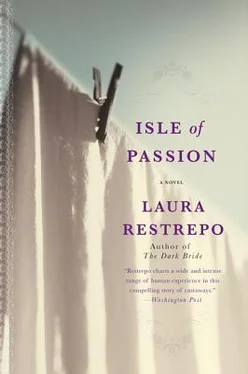Ramoncito came to help her.
“What are you doing, Mom?”
“I am burying the trunk.”
“What for?”
“To protect what is inside.”
“And what is inside?”
“The clothes and the money I am going to need the day we are rescued.”
“Are we going to be rescued?”
“Perhaps.”
“I don’t want to leave. Do you?”
“I do.”
“Why? Is it better somewhere else?”
“Much better. Perhaps.”
“And why do you need clothes the day we are rescued?”
“I don’t want to be pitied.”
“And you also saved clothes for me?”
“No, not for you. Your old clothes are too small for you.”
“Then I am going to be pitied?”
“No. I am going to buy you a new suit as soon as we land. And a pair of shoes.”
“I don’t like to wear shoes.”
“When you are there, you’ll like them.”
“I don’t like it over there. I don’t want to go.”
The rest of the women were still on the cliff side. Every day they clambered down the steep rock, competing with the waves in order to take away the ocean’s bounty of oysters, squid, and crayfish. Tirsa, the most skilled at this task, could not do it anymore and limited herself to offering instructions from higher up. Alicia heard their voices.
“They are coming,” she told Ramón. “Let’s hurry and finish burying this. They’re coming back early. They must have made a good catch.”
They were coming at a gallop, bolting like colts, but carrying no food. They stopped in a circle around Alicia, without saying anything. She saw them panting, extremely pale, a wild look in their eyes.
“What’s the matter, for God’s sake? Someone fell down?”
“No, ma’am.”
“What happened? Why won’t you tell me?”
“Because you will scold us if we tell you, ma’am.”
“The children! Something happened to the children?”
“No, nothing to do with the children. It’s because up on the cliff we saw — We saw Lucifer.”
“Are we going to start that again?” barked Alicia, making no effort to conceal her fury.
Tirsa, who had lagged behind, came then.
“It’s true, Alicia. This time I saw him myself.”
“Did you see the devil? You, too?” There was more sarcasm than surprise in Alicia’s voice.
“Yes,” Tirsa said. “Me, too. I don’t know if it was the devil, but it was some horrible being.”
Then, all started talking at once: he was tall, big, his red hair standing out, hairy all over, hairy only on his back. His eyes spewed fire, no, they were human but he had a snout instead of a mouth. His face was that of a man. He walked on all fours. He didn’t walk on four, only on three. In any case, he was on two legs, but he did not walk like other people. His skin was dark, dried up, he had scales like an iguana. He smelled putrid, and before he appeared on top of the cliff they had perceived his stink, like a rotten corpse. He was naked, and his private parts were the devil’s, or at least very big, and anyway, he was truly male, no doubt about that.
“The devil surely he’s not,” Alicia decreed. “So he is a man or a beast. Or he’s nothing, like so many other ghosts around here.”
“He’s a beast,” some women said.
“He’s a man,” said the others.
“Could he be a shipwrecked sailor who got here?” Alicia asked.
“Well, if he was shipwrecked,” Tirsa answered, “he must have lived at the bottom of the sea for years.”
They decided that a few women, armed with sticks and headed by Tirsa, would go around the isle. They would go to places they had not been since they had set essential perimeters of action for themselves.
“We’d better not go today. It’s already late and darkness will soon close in on us,” Benita pleaded.
“Yes,” agreed Tirsa, “we’d better do it tomorrow when it’s light.”
“Better never,” Alicia said. “Let’s not look for him, but wait and see if he appears. There is no hurry, since he has caused no harm so far.”
The women had a restless though quiet night. At dawn Alicia summoned all to the beach. When they arrived, they saw in Tirsa’s hands two kitchen knives, which she was sharpening on a stone.
“Are we going to hunt that demon we saw?” they asked.
“No. We aren’t hunting any demons. We are going to cut our hair,” Alicia announced, “because it’s interfering with our tasks. Besides, we cannot take care of it anymore, and, unkempt like this, our manes look frightful. We have all discussed this several times, it was decided long ago, and we’re finally doing it. Who will be the first volunteer?”
Rosalía was first, then Benita and Francisca. Alicia and Tirsa would grab the long tresses and shear them just below the ears, throwing the cuttings on a single pile that started to look like a sleeping hairy animal. Then Alicia and Tirsa cut each other’s manes. Someone brought the broken mirror; they looked at their short haircuts, and they all laughed.
“Let me see how you look,” Francisca said to Benita. “I bet you will not get any beaux with your hair like that.”
“And whom did you have in mind for me? The cliff monster?”
“I’ll wait for this child to grow up and marry me,” Rosalía said, lifting Ramoncito up in her arms and smacking kisses on his face. “And by then, my hair will be long again.”
“We are already shorn,” Alicia said. “All but you, Alta.”
“Not me, ma’am, I’m not cutting it.”
“Come on, you’re not eating enough for you and your hair.”
“No, ma’am, I can’t… because my German friend likes it.”
“Let it be, then. This girl is really in love.”
The little girls came running with their porcelain doll all battered and ragged.
“Alta! Dear Alta! Make a real wig for the doll,” they begged her, “she is tired of having no hair.”
“No hair, no hands, and only one eye. The poor thing is hopeless,” Alta said while choosing a good chunk of hair for the wig.
That afternoon Benita separated from the group to go salt the fish. She came back breathless, her face all flushed.
“The monster appeared, ma’am,” she told Alicia. “He’s — It’s Victoriano Alvarez.”
“What do you mean? Victoriano Alvarez died months ago.”
“No, ma’am, he didn’t die.”
“Of course he did. Scurvy did him in!”
“No, it didn’t kill him. He’s disfigured, but he didn’t die.”
“It must be another apparition. Did you touch him?”
“He touched me. He really did touch me.”
Benita said that she was cutting the fish in fillets and separating the bones when she smelled a strong, unpleasant odor. She thought of the fetid lagoon, or that maybe there was still an unburied corpse. The monster then came up behind her without making any noise. When she realized it, she jumped up and screamed, and he told her not to be frightened, that he was Victoriano.
“Victoriano Alvarez? Are you dead?” Benita asked him, almost in a whisper.
“I almost died, but I came back to life all by myself.”
She looked very carefully at the ghost who was facing her and recognized in him a remote resemblance to the lighthouse keeper, to the big and strong soldier of old. His legs were now bent and full of boils. In order to stand up he needed to support himself on a stick. His skin was spotty and his thin mat of flaming red, spiky hair continued in hard corkscrew tufts all down his back. He had toadlike eyes, and his gums had shrunk. He had no teeth.
“What happened to you that made you so ugly, Victoriano?”
“Hunger and disease did it.”
He said he lay dying in his hammock for many days in the lighthouse lair, and when his soul left him, the crabs invaded his den. When he woke up, he was able to catch and eat them by simply reaching out, and that had saved his life because he was so weak he could not even get up. When he was very thirsty, he dragged himself across the floor and lay faceup in the rain. As time passed and there were no signs of other human beings, he thought they had all died and he was the only survivor. He recuperated some and began hunting and eating boobies. They were raw, slimy, and reeking of iodine. As he could not get to his feet, he lay there, dead still, waiting for hours at a time until a bird got close enough to be hit. It took him quite a while to be able to stand up. Then, leaning on a stick, he would take a step, two steps, and fall. He needed to wriggle like a snake in order to reach the hammock and rest, to catch his breath before trying again. Days and nights went by, and he was finally able to wade on the beach and harpoon fish, hurling his regulation bayonet. He began to notice signs that he was not alone, to suspect that there were other survivors, and in his search for them he ventured a bit farther each time. He also said that the pain in his legs tormented him and that walking was torture. Two weeks before, he had discovered the other survivors, the women, and he spied on them day and night without being seen. He found out that the rest of the men had died: he knew that he was the last man on Clipperton Island.
Читать дальше












